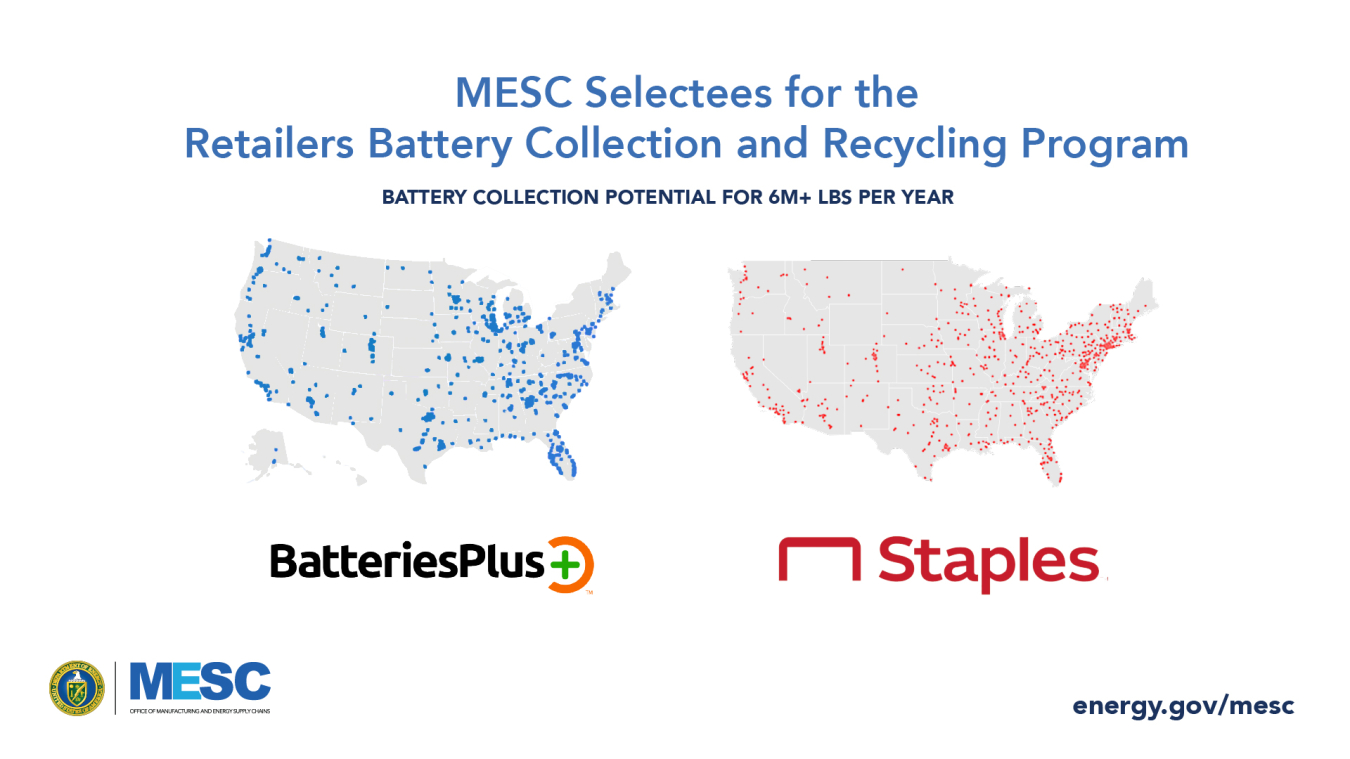DOE Retailers Battery Collection and Recycling Program Selectees Project Summaries
DE-FOA-002897 (Topic 4)
Batteries power our daily lives, from consumer electronics to national defense, and enable the electrification of the transportation sector and provide stationary grid storage. With funding from the Bipartisan Infrastructure Law (BIL), DOE is investing across the supply chain from research to manufacturing to collecting the batteries at end-of-life and helping to build domestic recycling network for batteries that contain critical elements such as Nickel, Lithium, Cobalt, Manganese, Copper, and Graphite. Many of these materials are in use today in consumer electronics with rechargeable batteries such as cell phones, laptops, vacuum cleaners, and smart watches.
Recycling spent batteries provides our domestic industry with additional sources of necessary materials to make new batteries or other products. Not only does recycling provide a diverse and robust material source, but the circularity of these materials builds a more sustainable manufacturing supply chain and reduces waste streams from manufacturing.
Retailers can play a vital role in making recycling accessible and easy for consumers. As sellers of batteries, retailers are top-of-mind for consumers. Once batteries are no longer usable, consumers need places to deposit their spent batteries. Retailer store fronts visited by consumers are prime locations for battery collection. Collection points can also serve as an incentive for consumers to visit store fronts.
DOE has selected two retailer projects for award negotiation under topic 4. The two projects will create over 1,000 new drop-off locations across the nation, and the projects have an emphasis on providing extended benefits to the community such as hiring local subcontractors and employees.
Selection for award negotiations is not a commitment by DOE to issue an award or provide funding. Before funding is issued, DOE and the applicants will undergo a negotiation process, and DOE may cancel negotiations and rescind the selection for any reason during that time.
Note: Learn more about the selections under topic areas 1-3 of the Department of Energy (DOE) Battery Recycling, Reprocessing, and Battery Collection Funding Opportunity (DE-FOA-0002897) here.

MESC Selectees for the Retailers Battery Collection and Recycling Program
Selectee: Staples
Project Title: Safest and Easiest Battery Recycling Solution in the U.S.
Project Location: Nationwide
Federal Cost Share: $7,028,641In September 2022, Staples launched a new and improved national Recycling Services program (approximately 1,000 stores). Our renewed focus on Recycling Services made recycling easy, accessible, and convenient for consumers and community members. As part of this program, Staples rolled out dedicated Recycling Centers within approximately 8% of stores (as of August 1, 2023). These centers not only made our recycling efforts more visible to customers but also enhanced our capacity to manage larger volumes of recyclables. Last year, and due in large part to these Recycling Centers, Staples collected close to 1 million batteries across all Staples stores nationwide, representing only a small fraction of the batteries within the market. Staples goal is to install Recycling Centers in the majority of Staples stores, with a targeted project goal to increase by approximately 375 stores over three years given the Consumer Electronics Battery Recycling, Reprocessing, and Battery Collection Funding Opportunity. With our existing locations, vendor partnerships, and logistics systems, Staples is well-positioned to leverage this opportunity to accelerate the growth of consumer recycling programs to help the Department of Energy realize their goal of building a robust domestic critical material supply chain for EV batteries in the United States. Executing on this scale hinges on effective consumer engagement, seamless integration of collection logistics, and robust market education programs. With the support of the Department of Energy, Staples aims to scale up existing programs and pioneer the next generation of battery recycling practices. Our comprehensive strategy does more than just enable responsible battery disposal; it cultivates a recycling-oriented mindset among consumers. Staples' dedication to this cause highlights its integral role in driving sustainability and contributing to a more environmentally conscious future.
Selectee: Batteries Plus
Project Title: Enhancing Safety while Reducing Labor Costs in a Nationwide Retail Battery Recycling Program
Project Location: Nationwide (700+ stores)
Federal Cost Share: $7,028,640
Batteries Plus aims to overcome the obstacles consumers face when recycling batteries and significantly increase the volume of batteries recycled. The high-level objectives of this project are to incentivize consumer participation by eliminating recycling fees, launching innovative educational and promotional campaigns, and focusing on reaching disadvantaged communities to ensure equitable access to this program. Additionally, Batteries Plus aims to improve recycling operations and safety by developing a new workstation to streamline battery sorting and packaging, reducing labor time and costs, and sharing this innovation with other retailers to strengthen efficiencies and circularity of the battery supply chain. To increase consumer participation, a multi-faceted marketing campaign and partnerships with professional sports teams will reach mainstream audiences and incentivize the consumer to act by bringing their battery recycling into their local Batteries Plus store.

